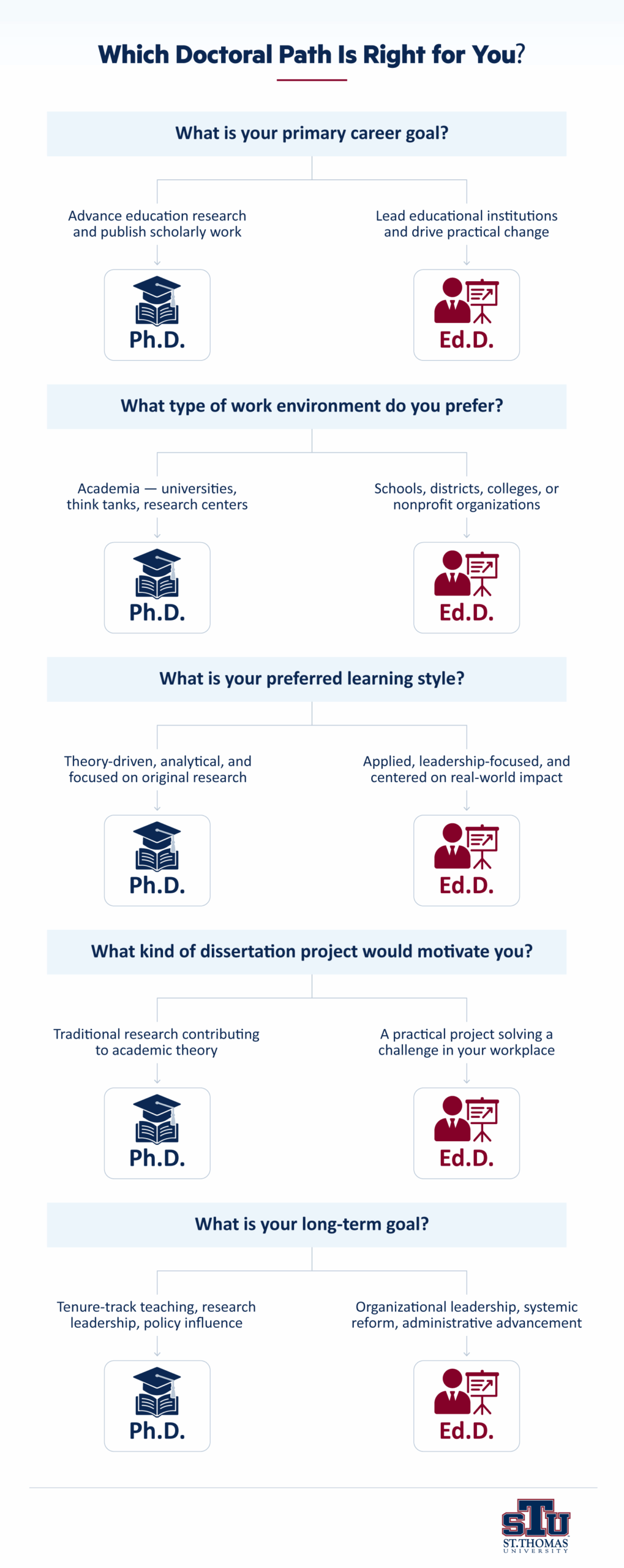
Choosing between an Ed.D. and a Ph.D. can shape your future in the field of education. Both are terminal doctoral degrees, but each serves different professional goals.
An Ed.D., or Doctor of Education, is designed for practitioners aiming to lead in K-12, higher education or nonprofit settings. A Ph.D., or Doctor of Philosophy, fits those focused on academic research and theory. Most applicants already hold a master’s degree and want an education program aligned with their career goals, whether that means shaping educational policy or leading institutions.
Ed.D. programs, such as the online Ed.D. in Educational Leadership programs from St. Thomas University (STU), typically take three to four years to complete, while Ph.D. programs span five to seven years. According to the U.S. Bureau of Labor Statistics (BLS), doctoral degree holders face just a 1.2% unemployment rate.
As enrollment in doctoral programs grows, understanding the differences between these two paths is key. This guide compares core elements — dissertation style, specialization, time commitment and career paths — so you can find the right fit. In addition, the guide highlights admissions requirements, the value of accredited programs and real-world outcomes across educational institutions.
Whether you’re considering a full-time program or balancing work and study, this breakdown of doctorate in education options and their practical applications will help clarify your next graduate school step.
What Is an Ed.D.?
An Ed.D. is a practice-focused doctoral degree tailored for education professionals seeking leadership roles in real-world settings. These programs are grounded in applied research and problem-solving, making them ideal for Ed.D. students focused on making a tangible impact in schools, districts and beyond.
Graduates commonly pursue leadership roles such as:
- Superintendent: Leads school districts and sets strategic direction
- Principal or assistant principal: Manages daily operations and school improvement efforts
- Education administrator: Oversees academic programming and policy at institutions
- Curriculum director: Develops instructional strategies and curriculum standards
Ed.D. programs typically include these degree requirements:
- Capstone or applied dissertation: Focused on solving practical challenges in education
- Leadership and policy coursework: Builds expertise in educational leadership
- Field experience or internships: Provides real-world exposure in administrative settings
- Collaborative projects: Encourages peer engagement and organizational impact
Ed.D. graduates earn an average annual salary of $92,000, making it a compelling option for those committed to educational leadership without leaving the profession for academia.
What Is a Ph.D. in Education?
A Ph.D. in education is an academically rigorous, research-intensive degree intended for those who want to generate original knowledge and contribute to the theoretical foundations of teaching and learning. Unlike the Ed.D., which prioritizes leadership and practice, the Ph.D. program emphasizes original research, data analysis and scholarly publication.
Graduates of a Ph.D. in education often become university professors, academic researchers or leaders in education think tanks. These roles involve publishing peer-reviewed research, teaching future educators and shaping the direction of the field through new knowledge.
Ph.D. candidates typically complete a traditional dissertation that contributes original research to the discipline. Coursework often focuses on theory, methodology and advanced statistics, preparing students to examine systemic challenges in education at a scholarly level.
In 2023, 98.6% of research doctorate recipients earned a Ph.D., showing its dominance in academic circles. The average salary for Ph.D. holders in education is $120,419, reflecting the degree’s value in research and university-level positions.
Ed.D. vs. Ph.D.: Key Differences Table
Both the Ed.D. and Ph.D. are rigorous doctoral programs, but the right choice depends on your goals, learning preferences and career opportunities. These degree programs differ in terms of time commitment, dissertation expectations, coursework focus and real-world outcomes.
Whether you’re passionate about curriculum development, research or leadership, this side-by-side table can help you compare key features of the Ed.D. vs. Ph.D. experience:
| Category | Ph.D. in education | Ed.D. in education |
| Primary goal | Advance original research and generate new knowledge | Apply research to solve real-world problems in education |
| Format | Full-time, campus-based or hybrid | Often part-time, flexible and online-friendly |
| Duration | Typically 5-7 years | Typically 3-4 years |
| Funding | May offer fellowships, research or teaching assistantships | Limited funding; usually self-funded or employer-supported |
| Dissertation style | Research-based, contributes to academic theory | Applied project addressing a specific institutional need |
| Coursework focus | Theory, methodology and academic research | Leadership, equity and organizational change |
| Career focus | Academia, research or policy | K-12 or higher education administration |
| Common roles | University professor, researcher, policy advisor | Superintendent, college dean, district administrator |
| Outcomes | Publishing, tenure-track teaching, research impact | System-level leadership, policy implementation, institutional reform |
| Average salary | $120,419/year (Ph.D. holders) | $149,166/year (Ed.D. superintendents) |
Which Degree Fits Your Career Goals?
Choosing between a Ph.D. and an Ed.D. often depends on your desired career options and the kind of impact you want to make. Do you want to generate new knowledge through research or lead institutions and implement change?
Ph.D. programs are designed for individuals aiming to shape academia — pursuing education research, publishing original work and mentoring future educators. In contrast, Ed.D. programs serve professionals targeting leadership positions in K-12 systems, higher education administration or nonprofit organizations. These programs emphasize applied learning that directly affects students, faculty and communities.
Education administrators considering the Ed.D. often prioritize real-world application over academic theory. Meanwhile, aspiring scholars and university faculty typically choose the Ph.D. to build careers in academia. Jobs for health specialty teachers are projected to grow by 19% through 2033, reflecting strong long-term demand across education sectors. Whether your path leads to academia or institutional leadership, aligning your degree with your goals is key to advancing your impact in education.
Aspiring Researchers and Academics
Ph.D. programs are built for those who want to make theoretical contributions to education and pursue careers in research and academia. These programs develop skills in original research, scholarly writing and instructional theory.
Common roles for Ph.D. graduates include:
- University professor: Teaches, publishes and mentors future educators
- Education researcher: Designs studies that inform instructional methods and policy
- Think tank analyst: Translates research into insights for policymakers and institutions
- Policy consultant: Applies evidence-based findings to improve educational systems
Doctoral degree holders earn an average annual salary of $118,456 annually ($2,278 per week), making the Ph.D. a valuable credential for those targeting long-term roles in academia and research.
Education Leaders and Practitioners
The Ed.D. is structured for education professionals who want to lead change in real-world contexts or promote educational innovation. These programs emphasize leadership development, applied research and system-level improvement in schools and educational organizations.
Career outcomes for Ed.D. graduates include:
- School superintendent: Oversees district strategy, budgeting and instructional leadership
- College dean or director: Manages academic units, staff and student outcomes
- District administrator: Directs curriculum planning, compliance and operations
- Professional development leader: Leads educator training and staff capacity-building
Superintendents earn an average salary of $149,166 annually, reinforcing the value of an Ed.D. for those pursuing high-impact roles in school districts and other real-world education settings.

Real-world Outcomes and Alumni Voices
The choice between Ed.D. programs and Ph.D. tracks goes beyond curriculum — it’s about where each path can take you. For many students, the value of an advanced degree comes down to its practical application in the real world.
STU online Ed.D. program alumni and Reddit users across education and academia forums have shared insights that shed light on both options. Their experiences speak to career applicability, job prospects and what to consider when evaluating a doctoral program.
“I wanted to solidify my position as an educator and attain an additional skill set so I could continue to lead at a higher education institution. … I decided on St. Thomas University because a lot of the [Ed.D.] curriculum had to do with a background in management, as well as innovative ways the world is working now in business and education.”
- Shirley Sims-Gibbs, graduate, STU online Ed.D. in Educational Leadership – Administration program
“With the [Ed.D.] degree, I can pursue either of my long-term goals. I could go into the building administrative level or into corporate training in data analysis and statistics.”
- Cory Los Schumacher, graduate, STU online Ed.D. in Educational Leadership – Administration program
“I do feel that the way we analyze things makes us better critical thinkers, and I think all of the [STU Ed.D.] courses prepare us as we prepare to go out into the world as doctors and leaders in our various fields.”
- Joe Hogan, graduate, STU online Ed.D. in Educational Leadership – Administration program
“The Ed.D. is the practitioner-based degree, the Ph.D. is a theoretical-based degree. Both carry equal merit. Ed.D.s hold weight in additional departments and career paths. They also carry particularly additional merit and job prospects when the degree is awarded from exceptional educational research universities…”
“Maybe search LinkedIn profiles or websites with school district org charts to review bios of school leaders in positions you want to see where they went to school and what credentials they have earned. And simply, check the state edu board page for requirements.”
“No two Ph.D.s in education are the same. What you should do is identify programs and professors who might serve your interests and what you think will support your lifestyle while completing the degree. Once you identify them, try to read some of the professors’ work to see if their research foci might somewhat fit what you want to do.”
These reflections reinforce that no single path is best — the right doctoral program depends on your goals, your environment and the kind of real-world change you want to lead.
Choosing the Right Doctoral Path for Your Career Goals
Choosing between an Ed.D. vs. Ph.D. is more than an academic decision — it’s a personal one that shapes your professional identity. Both doctoral degrees open paths to advanced leadership roles, but they serve different purposes.
The Ph.D. prepares scholars for research-intensive work, publishing and university-level teaching. The Ed.D. is designed for leaders ready to drive change in real-world settings, ranging from school districts to higher education and public policy.
If your goals include shaping education from within institutions, managing teams or leading systemic reform, the Ed.D. offers direct application of knowledge and leadership training that suits you. Explore STU’s Ed.D. in Educational Leadership online programs to see how these degree options can support your vision for meaningful impact in education.

FAQ
Here are answers to common questions about these terminal degrees in education.
What is the main difference between an Ed.D. and a Ph.D.?
An Ed.D. focuses on applying research to solve real-world problems, while a Ph.D. is centered on producing original research for academic advancement.
Can I teach at a university with an Ed.D.?
Yes. While Ph.D. holders are more common in research institutions, Ed.D. graduates can teach in postsecondary programs, especially in leadership and practitioner-focused courses.
Is a Ph.D. more respected than an Ed.D.?
Not necessarily — it depends on the setting. In academia, a Ph.D. may carry more weight, but in leadership roles within schools or districts, the Ed.D. degree is highly respected.
Do Ed.D. programs require a dissertation?
Yes, though it’s often an applied research project rather than a traditional theoretical dissertation.
Are Ed.D. programs available online?
Yes, many online Ed.D. programs offer flexible formats designed for working professionals pursuing a terminal degree without relocating.